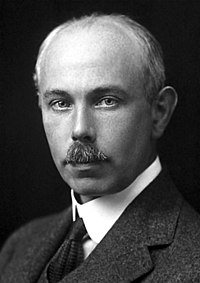
Back فرانسيس أستون Arabic فرانسيس استون ARZ Francis William Aston AST Frensis Aston Azerbaijani فرانسیس ویلیام آستون AZB Фрэнсіс Уільям Астан Byelorussian Франсис Уилям Астън Bulgarian ফ্রান্সিস উইলিয়াম অ্যাস্টন Bengali/Bangla Francis William Aston BS Francis William Aston Catalan
Francis William Aston | |
|---|---|
 Aston in 1922 | |
| Born | 1 September 1877 Harborne, Birmingham, England |
| Died | 20 November 1945 (aged 68) Cambridge, England |
| Nationality | English |
| Citizenship | British |
| Alma mater | Mason College (as issued by University of London) Trinity College, Cambridge |
| Known for | Mass spectrograph Whole Number Rule Aston Dark Space[1] |
| Awards | Mackenzie Davidson Medal (1920) Nobel Prize for Chemistry (1922) Hughes Medal (1922) John Scott Medal (1923) Paterno Medal (1923) Royal Medal (1938) Duddell Medal and Prize (1944) |
| Scientific career | |
| Fields | Chemistry, physics |
| Institutions | Trinity College, Cambridge |
| Doctoral advisor | Percy F. Frankland[citation needed] |
| Other academic advisors | J. J. Thomson John Henry Poynting[1] William A. Tilden[1] |
Francis William Aston FRS[2] (1 September 1877 – 20 November 1945) was a British chemist and physicist who won the 1922 Nobel Prize in Chemistry for his discovery, by means of his mass spectrograph, of isotopes in many non-radioactive elements and for his enunciation of the whole number rule.[3][4] He was a fellow of the Royal Society[2] and Fellow of Trinity College, Cambridge.[5]
- ^ a b c "Francis W. Aston - Biographical". NobelPrize.org. The Nobel Foundation. Retrieved 5 October 2017.
- ^ a b Cite error: The named reference
frswas invoked but never defined (see the help page). - ^ "The Nobel Prize in Chemistry 1922". Nobel Foundation. Retrieved 14 April 2008.
- ^ Squires, Gordon (1998). "Francis Aston and the mass spectrograph". Dalton Transactions (23): 3893–3900. doi:10.1039/a804629h.
- ^ Cite error: The named reference
obitwas invoked but never defined (see the help page).